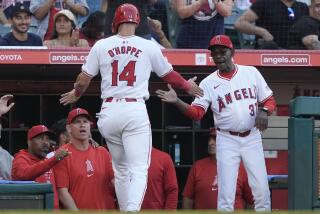For Now, Angels Not in Mariners’ League
- Share via
I am sitting in Mike Scioscia’s office, listening to the Angel manager say he still believes this is “a championship-caliber team that isn’t intimidated by anyone” and that he can’t let his players worry about the Seattle Mariners “until we get our own house in order and consistently play better.”
I am leaning against a wall in a corridor outside the Angel clubhouse listening to pitching coach Bud Black say that Scott Schoeneweis, Jarrod Washburn and Ramon Ortiz, the three young starters the club is banking so heavily on in a rotation devoid of a veteran leader and stopper, “continue to learn every time out but when you hear guys like Greg Maddux and Tom Glavine say they are still learning, you realize how long the road is,” and “you can’t expect a guy with only one or two years of service time to be a No. 1 pitcher.”
I am standing in the press box listening to General Manager Bill Stoneman say he is not discouraged by Seattle’s 16-game lead over the Angels in the American League West at the start of the weekend because “to be discouraged would be to take the fun out of the season” and while the deficit is real and a big challenge, “our pitching has been just great and the only disappointment is that some of the hitters we were counting on have gotten off to a slow start.”
I am sitting in front of my computer, staring at a blank screen, thinking about what I have been hearing, aware that Angel leadership, knowing there are four months’ worth of games to be played and tickets to be sold, either can’t say it as it really is or are truly blinded by pixie dust from the Magic Kingdom.
The standings have been skewed some by Seattle’s all-world start, but the Angels’ 26-28 record seems to be a pretty honest reflection of a team that may prove to be championship caliber, that may prove there is fun to be had--but probably not before 2002.
The hard truth of another summer turned sour is this:
* The pitching staff, although a bit better than anticipated, simply doesn’t have that one stopper for the three younger starters to feed off and isn’t consistent enough to carry a struggling offense or maintain the type of streak needed to catch the Mariners. Scioscia insists that pitching hasn’t put his team in its current predicament, but neither can the Angels predict what they will get from their pitchers from start to start. No Angel starter won more than seven games last year, and none has more than Schoeneweis’ four coming up to a third of the season.
* A disappointing offense is averaging about one run a game less than last year, is hitting less than .240 with runners in scoring position and, in a league where offense is still essential, gives away too much power at first base, designated hitter and catcher. That’s particularly true with Mo Vaughn out for the year, corner outfielders Tim Salmon and Garret Anderson failing to duplicate their 2000 production and Darin Erstad only recently recovering his 240-hit consistency.
Do the Angels miss Mo?
Of course.
Does Seattle miss Randy Johnson, Ken Griffey Jr. and Alex Rodriguez?
Who?
The Mariners reached the playoffs without Griffey and Johnson last year because they acquired Aaron Sele as a rotation ace, John Olerud as a batting title contender, Kazuhiro Sasaki and Arthur Rhodes to close out games from the bullpen and Mark McLemore and Stan Javier to improve the bench. They also caught lightning with the development of starting pitchers Freddy Garcia and John Halama and infielder Carlos Guillen, all obtained in the 1998 trade that sent Johnson to the Houston Astros.
Now the Mariners are headed back to the playoffs, despite the loss of Rodriguez, because, in part, they aggressively signed Jeff Nelson to make a strong bullpen even stronger and won the bidding for Ichiro Suzuki, who may be baseball’s best right fielder, as well as leadoff batter, no matter the continent.
Those are the type of moves that haven’t been seen in Anaheim, where “aggressive” isn’t a word associated with the current administration or the Disney ownership, aside from the preemptive offer to free agent Vaughn after the 1998 season and the recent shuffling of designated hitters.
While Seattle has rebuilt in the last two years, reacting to the loss of three future Hall of Famers, Stoneman has addressed his pitching needs by acquiring the lamentable Kent Bottenfield in the Jim Edmonds swindle (no disrespect to bona fide second baseman Adam Kennedy), and Pat Rapp and Ismael Valdes (who are a combined 3-8) as modestly priced free agents with no recent indication either could fill the No. 1 role.
Similarly, while news of the Vaughn injury hit late, forcing Stoneman to scramble for a first baseman, he did nothing to beef up the shortstop or DH positions during a winter in which there were several candidates for both.
Historically, of course, the Angels have made mistake after mistake, thinking they were better than they were or that one player could guarantee a World Series. There is a difference, however, between judicious and comatose.
If Scioscia--who continues to build respect in his second season as a major league manager--truly believes he has a championship caliber team, what would he have if Disney/Stoneman had shown some of Seattle’s aggressiveness?
Instead, a passivity that starts at the top seems to permeate Edison Field, no matter whom you listen to and where.
Said Stoneman, in the press box, “Seattle is showing people what team baseball is all about.”
Of course, that’s because Seattle has shown people how to put that team together.
More to Read
Go beyond the scoreboard
Get the latest on L.A.'s teams in the daily Sports Report newsletter.
You may occasionally receive promotional content from the Los Angeles Times.






